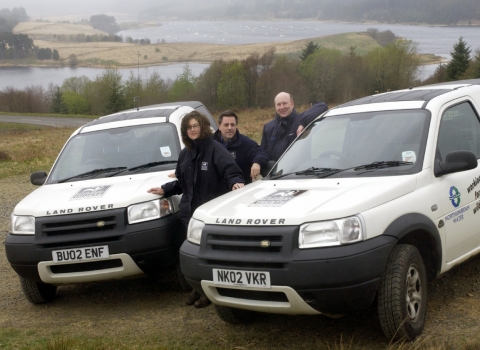Questions about the Trust and its work
On this page you'll find answers to some of the most frequently asked questions about the Trust and its work. If they don't answer your query feel free to contact us by email mail@northwt.org.uk or call us on 0191 284 6884.
Are you funded by the Government or local councils?
Northumberland Wildlife Trust Ltd is an independent registered charity – it is not part of the council or the government. We rely on donations given by our members and supporters.
However, in common with other landowners, managers and farmers the Trust can apply to government funding schemes for specific areas of our work, such as Environmental Stewardship and Woodland Management grants. We also participate in the Gift Aid scheme which allows all charities to recover from HMRC the tax paid on donations given by tax payers.
Where we identify the need to carry out particular projects, activities or works we make determined efforts to secure financial support from a range of sources including Heritage Lottery Fund, The Landfill Communities Fund, charitable trusts or even statutory agencies.
I’d like to book onto an event. How do I go about it?
Visit our Events page for full details of upcoming events throughout the region, including location information, cost and contact details.
Do you have a Trust shop I can visit?
We have a selection of items for sale at our Hauxley Wildlife Discovery Centre and the cafe at Northumberlandia. Alternatively you can purchase items from the shop page on our website (but this does incur a postage cost). These include a variety of cards, wildlife books, soft toys, mugs, children's activity kits and much more.
Can you provide a speaker for our community group meeting?
NWT staff can be available to deliver talks on a variety of topics, from the wider world of conservation to specific Trust reserves, education and grazing programmes depending on availability around current project and reserves work. If you are interested in booking a speaker, please contact us to discuss possible subjects on (0191) 284 6884. We recommend a donation of £50 per talk plus any travel expenses.
I would like to volunteer with the Trust. How can I find out more?
We have a range of opportunities for volunteers, which updates on a regular basis, and we would be pleased to welcome you! Visit our Volunteer page for more information including role descriptions and an online enquiry form.
Do you take work experience students?
Contact our Volunteer Co-Ordinator on (0191) 284 6884 to discuss placements, as this is on a case-by-case basis and cannot be guaranteed.
A proposed development near me will destroy wildlife. What should I do?
Northumberland Wildlife Trust cares about all wildlife sites but as a charity we have limited resources. This means we cannot respond directly to every threat we hear about. Therefore, in addition to commenting on applications ourselves, we are actively encouraging people to take action to protect their local environment. Visit our Planning page for information on how you can comment on applications, our latest responses and current council strategies.
My local council is launching a new planning document. Is the Trust involved?
We respond to most key planning documents in the county so it’s likely that we’ll be standing up for wildlife by responding to policy content, site allocations and guidance on design etc. More information is available on the planning pages but if you’d like to discuss a specific document please email us (mail@northwt.org.uk) and we'll respond as soon as possible.
I have some land and would like to create a small reserve to attract wildlife. I need some help with designs and technical considerations. Can you help?
We can try! However the answer will depend on what features the site has already which can be utilised –such as patches of scrub/shrubbery or a small pond. It may already include orchard trees or grasslands. For more information and advice on gardening for wildlife, including a downloadable guide, visit our website here. For specific queries, please email us (mail@northwt.org.uk) and we will make sure that you are contacted by the appropriate person to advise you.

